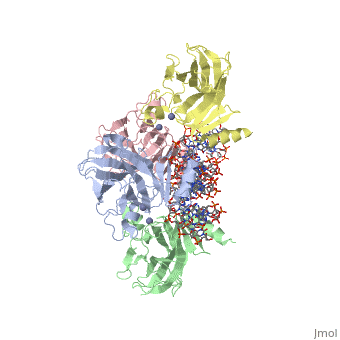We apologize for Proteopedia being slow to respond. For the past two years, a new implementation of Proteopedia has been being built. Soon, it will replace this 18-year old system. All existing content will be moved to the new system at a date that will be announced here.
P63
From Proteopedia
(Difference between revisions)
| Line 2: | Line 2: | ||
== Function == | == Function == | ||
| - | '''P63''' is a tumor protein belonging to the P53 family. It is a multi-isoform protein required for epidermal development<ref>PMID:10594758</ref> | + | '''P63''' is a tumor protein belonging to the P53 family. It is a multi-isoform protein required for epidermal development<ref>PMID:10594758</ref>. P63 domains structure is similar to that of P53 with an N-terminal transactivation domain (TAD) followed by proline-rich region, DNA-binding domain (DBD) and tetramerization domain. In addition, the P63 contains an additional C-terminal region with SAM (Sterile a-Motif) and transactivation inhibitory domains. The SAM domain is involved in protein-protein interactions. |
== Disease == | == Disease == | ||
| Line 10: | Line 10: | ||
== Relevance == | == Relevance == | ||
| - | + | One isoform of P63 is involved in skin development and stem/progenitor cell regulation<ref>PMID:17224652</ref>. Another isoform functions in apoptosis<ref>PMID:16998800</ref>. | |
</StructureSection> | </StructureSection> | ||
Revision as of 10:05, 13 June 2016
| |||||||||||
3D Structures of P63
Updated on 13-June-2016
References
- ↑ Parsa R, Yang A, McKeon F, Green H. Association of p63 with proliferative potential in normal and neoplastic human keratinocytes. J Invest Dermatol. 1999 Dec;113(6):1099-105. PMID:10594758 doi:http://dx.doi.org/10.1046/j.1523-1747.1999.00780.x
- ↑ Leoyklang P, Siriwan P, Shotelersuk V. A mutation of the p63 gene in non-syndromic cleft lip. J Med Genet. 2006 Jun;43(6):e28. PMID:16740912 doi:43/6/e28
- ↑ Tadini G, Santagada F, Brena M, Pezzani L, Nannini P. Ectodermal dysplasias: the p63 tail. G Ital Dermatol Venereol. 2013 Feb;148(1):53-8. PMID:23407076
- ↑ Koster MI, Dai D, Roop DR. Conflicting roles for p63 in skin development and carcinogenesis. Cell Cycle. 2007 Feb 1;6(3):269-73. Epub 2007 Feb 3. PMID:17224652 doi:http://dx.doi.org/10.4161/cc.6.3.3792
- ↑ Petre-Lazar B, Livera G, Moreno SG, Trautmann E, Duquenne C, Hanoux V, Habert R, Coffigny H. The role of p63 in germ cell apoptosis in the developing testis. J Cell Physiol. 2007 Jan;210(1):87-98. PMID:16998800 doi:http://dx.doi.org/10.1002/jcp.20829

